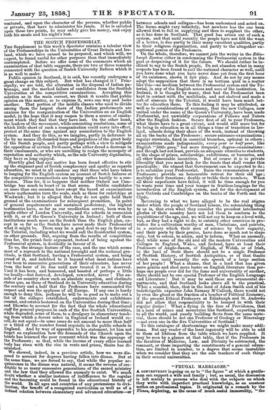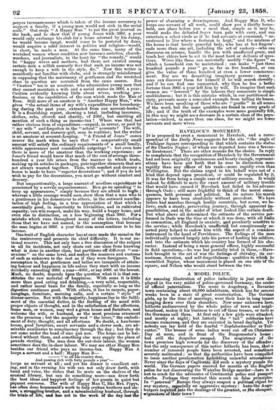"FRUGAL MARRIAGES."
OONTROVERSY is going on as to "the figure" at which a gentle- man can support a wife and. family ; but, as usual, the discussion is left mainly to persons who deal with the subjects on which they write with imperfect practical knowledge, as an amateur writes on profeasimal topics. It originated in a remark by the Thaws, deploring, ss the cause of much social immorality, "the prepos terousmeasure which is taken of the income necessary to support a family, if a young man would not sink in the social scale." Out steps "A Happy Man" to pat the great journal on the back, and to show that if young Jones with 3001. a year would only exchange his club for a home adorned by his Jenny, he would become range, would cease to be pestered by duns, would aoquire a solid. interest in politics and religion—would, in short, be made a man. At the same time, many of the wretched women whose condition now harasses societies, church- wardens, and journalists, in the hunt for "the remedy," would be "happy wives and mothers, had there not existed among Certain men a selfish unmanly fear that such an income was not enough to keep a wife in the style, &c." Now this writer is manifestly not familiar with clubs, and is strangely misinformed in supposing that the matrimony of gentlemen and the wretched class in question are recruited from the same source. But "Caution" too is an amateur, who admonishes young men that they cannot maintain a wife and a social status on 3001. a year; Caution evidently knowing little about wives, working pro-. Cessions, or the capabilities of the sum which made the Man of Ross. Still more of an amateur is "Another Happy Man," who Oyes "the actual items of my wife's expenditure for housekeep- ing during the past year, extracted from our account-books."
i
It s a flourishing report, showing a total, including insurance, clothes, cabs, church and charity, of 2301., but omitting all mention of such a thing as income-tax ! Where was that last rather obvious item of expenditure—unpaid, in arrear, or paid by "my wife" and forgotten in the "actual" accounts? The wife, child, servant, and nursery-girl, may be realities; but the writer is an amateur at account-keeping. "A Friend of Jones" comes nearer the mark when he says that "a comparatively small amount will satisfy the ordinary requirements of a small family, rthile appearances need considerable outgoings " : but even here there is more of the amateur than the working experience ; or Jones's friend would know that much of the cost of average three- hundred a year life arises from the manner in which trade, niaking up its articles in packages puts together elements that are not always wanted together. Thus, with comfort and decency a house is made to have "superior decorations"; and if you do not wish to pay for the decorations, you must go without comfort and decency.
But unquestionably, a large amount of needless expenditure is
occasioned by a servile sequaciousness. Men go on spending " to keep up appearances," simply because they are afraid to begin; whereas a little courage would soon show them that a man who is a gentleman in his demeanour to others, in the outward manifes- tation of high feeling, in a true appreciation of that which is essentially good, in superiority to trivialities, and in cultivated capacity, can win respect, make his way, build a happy home, and even rise to distinction on a less beginning than 3001. For a mistake which runs throughout many of the letters including those that we have not named, is the assumption letters, because the man begins at 3001. a year that sum must continue to be his income.
One trait of English character has at once made the occasian for the controversy and presents its chief difficulty. It -is our na- tional reserve. This not only bars a free discussion of the subject
in all its incidents, not only shuts out one class from knowing what is done in another class but partitions off different " con- nexions " on the same level, and makes the manners and customs
of each as unknown to the rest as if they were foreigners. The assumption is that gentlemen and ladies are incapable of attain-
ing honour and happiness in life unless they start with an income decidedly exceeding 3001. a year-4001., or say 500/. at the lowest. Much, no doubt, depends upon the question what it is that con- stitutes the raw material of happiness. With some it is little more than good eating and drinhng,—a very solid, respectable, and rather moral basis for the family, especially so long as the digestion continues good. With others it lies in carpets, paper- hangings, furniture, morning calls, and a certain style" of dinner-service. But with the majority, happiness lies in the fulfil- ment of the essential duties, in the feeding of the mind with proper objects of thought, and in the satisfaction of the affections. Some men, or women, may wed a given house and furniture, and welcome the wife, or husband, as the most precious ornament on the premises ; but the majority wed "the lover," the embodi- ment of duty, thought, and all affections. No doubt, a handsome house, good furniture, smart servants and a clever cook, are ad- mirable auxiliaries to complacency through the day ; but they do net come under the head of sine qua non. The home can be hal- lowed without them and something else may supply the place of pounds sterling. The man does the out-door labour, the woman sometimes does the in-door labour. We may see other Happy Men besides our friend who pays no income-tax. Happy Min A keeps a servant ancl a half ; Happy Man I3--
— " to all his country dear, And passing rich with forty pounds a year"—
keeps no servant at all ; and yet his dinner is excellent eat- ing, and in the evening his wife can not only draw forth, with hand and voice, the riches that lie mute on the shelves of the musical library, but can do something more—can draw forth the best ideas and happiest feelings of her guests in quiet but piquant converse. The wife of Happy Man C, like Mrs. Pepys, has often done housemaid's work to help orphan brothers and sis- ters, a struggling brother, and a miscalculating husband, throughthe trials of life, and has not in the work of the day lost the
power of charming a drawingroom. And Happy Man D, who keeps one servant of all work, could show you a thrifty house- hold, can place before you a meal that, simple as it may be, would make the defeated Boyer turn pale with envy, and can entertain a select circle as if he had servants at command, " ac- customed to live where a footman is kept," and the mistress of the house is that lovely graceful lady, who has at her fingers'- ends more than one art, including the art of cookery—who can discourse on science, handle the pen with unaffected grace, and teach her elders how to act in the most hard or delicate of ques- tions. Wives like these can materially modify "the figure " on which a household can be maintained ; can make "just three hundred pounds a year" go as far as five hundred, or can give the value of three hundred at even a lower commence- merit. Nor are we describing imaginary persons : many a man can discover them for himself if he will search cleverly; and if he can find one unmarried, why then he has a better fortune than 300/. a year left him by will. To imagine thatsuch women are " lowered " by the labours they consecrate is simple snobbishness ; but it is this mistake which, in our partitioned m- oiety, prevents many a concealed example from telling its lessen. We have been speaking of those who are " gentle " in all senses of the word, but the same qualities are found in every grade of life ; and if the truth of the examples were more generally felt, in this way we might see a decrease in a certain class of the popu- lation—indeed, in more than one class, for we might see fewer servants and more wives.



































 Previous page
Previous page